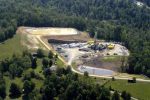- Like
- Digg
- Del
- Tumblr
- VKontakte
- Buffer
- Love This
- Odnoklassniki
- Meneame
- Blogger
- Amazon
- Yahoo Mail
- Gmail
- AOL
- Newsvine
- HackerNews
- Evernote
- MySpace
- Mail.ru
- Viadeo
- Line
- Comments
- Yummly
- SMS
- Viber
- Telegram
- Subscribe
- Skype
- Facebook Messenger
- Kakao
- LiveJournal
- Yammer
- Edgar
- Fintel
- Mix
- Instapaper
- Copy Link
This page assumes you are the owner of the surface tract NEXT DOOR to the surface tract where the well pad is being placed. This page only applies to you if you are NOT the owner of the surface tract where the well pad is located (or significant disturbance actually occurs). If you are the person who owns the surface tract where the well pad will be placed, it is WVSORO’s position that the driller does not have a right to put a well pad (or other significant surface disturbance) for long horizontal well bores on your surface tract without your consent. If you are in that position you should visit our page on that subject. And if you are the owner of the surface tract where the well pad is located and you decide to sell, then you should be paid not what your land was worth to you before the buyer showed up, but what the use of your land is going to be to the driller. The driller is going to put a well pad on you that may, over 20 years or so, produce a quarter billion dollars worth of gas! Consider a farmer selling his meadow next to a four-line highway to Exxon for a gas station/convenience store. The farmer should not sell his land for what the land and used to be worth as a meadow — he should sell it for the value of the land to Exxon as a gas station/convenience store. Likewise, a surface owner where a well pad is going to be placed should sell for what having a well pad is worth to the driller. The selling price should not be based on the number of acres, it should be based on the volume of gas produced.
The rest of this page back to advice for people whose surface tract is NEXT to a surface tract where a pad or other disturbance is being proposed.
If you own a house on a surface tract neighboring the surface tract where the well pad is going to be built, the driller may be willing to buy you out. The driller may be willing to do that in order to put the well pad just where they want it (because the center of the well pad has to be 625 feet from your house). The driller may be willing to do that in order not to avoid putting in extra protections against noise etc. that the driller ought to put up (though applicable noise ordinances are rare in rural West Virginia). Or the driller may not want to risk you filing a nuisance etc. lawsuit if there is no noise etc. ordinances to rely upon. (See our web page about that.) Or the driller may want you to not file comments with the State about the driller’s drilling permit which could slow down their plans (although that leverage for you does not last all that long it is important for some drillers). Or the driller may want to use your land for storing pipe etc. Or the driller could just be considerate.
If the driller offers to buy you out, we recommend that you do that if they pay your right price. It is hard to find anyone who, after they signed a surface use agreement, stayed next to a well pad and who, after the drilling was over, thought they agreed to enough money in advance to compensate them for the annoyance and inconvenience and reduction in property value that actually happened. But how much should you get? How should it be calculated?
We have known drillers to offer 15% or 20% above the value of an appraisal of your property by a professional appraiser. But we think there is a better way to calculate value and argue for what you should get. We think the best way is to use the calculations that we understand the State of West Virginia uses when it compensates people the State makes move in order to build or move a road.
Here is what the State does and what we recommend:
Start with figuring out a “replacement value”. (That is not technically the same as an appraiser’s “market value”. We have been disappointed with some appraisers’ valuations.) Look around in your area for the same kind of house and land for sale. If you have children you might want to look for one that will be in the same school district. You also should look for one that does not greatly extend your commute to work. Find out the amount for which that house and land is being offered for sale and get ready to buy it (or at least argue that is the amount of money you should be paid). (You can also look in the courthouse record room for a deed for property near you that has recently been sold. At the bottom of the deed will be the value paid in that sale.) You should get paid that much to start with. But you should get more than just the replacement value. Keep reading.
The driller should also pay you the closing costs on buying your new place — like the cost of a title examination or even a survey or home inspection. Whatever it costs. The driller may be willing to give you that additional amount when they close on your house and you sign the deed to them, or they may want to be billed for that additional amount at a different time when you actually close on your new house..
Next get an estimate for the cost of hiring a moving company to move all of your stuff to the new place. In many areas a good rule of thumb is $200 for the amount of furnishings it takes to furnish one room. (Sometime things are stuffed in attics or garages, but that figure how many room’s full of stuff those hold.) You should also get the cost of moving insurance for damages that happen during the move. Again, the driller may want to give you that additional amount up front at closing, or get billed for it at another time.
Finally, and this is a little complicated, you should check into the difference in the mortgage interest rates of your current mortgage and what the rate will be for your next mortgage on your replacement home. When they offer to pay you the replacement cost of your current home someone still has to pay off the mortgage on your current home. When the driller buys your old house, instead of giving you all of the replacement value, the driller will probably write a check to the bank pay off your old mortgage and then give you a check for the rest — which you would use for a down payment on the mortgage on your new house. If the interest rate on the mortgage for your new replacement house is going to be higher than the interest rate on your old mortgage, your total of payments to finish paying for your new house may be higher than your total of payments left on the mortgage on your old house. The driller should give you that amount in addition in order to increase your equity so the amount and number of your current monthly mortgage payments and the amount and number of your new mortgage payments will be the same. This is sometimes called a “buy down”. It will take your banker or a real estate agent to figure all that out.
Some drillers may want to write separate checks for each of these costs as they occur. We suspect most drillers will not want to follow through the process and write checks for these things as you go. Most driller will probably want you to agree to one amount up front. Then they will write one check to the bank to pay off your old mortgage and one to you. If they just want to write you one check, you should think about the replacement cost, closing costs, moving expenses, and mortgage buy-down etc. before you agree to an amount. Call us with questions.
Note: If the driller is using the well pad on the surface tract next to you for drilling horizontal well bores into the mineral tract under your old home, some driller’s will argue that they have a right to reasonable use of your surface — so they can make nuisances on your land, and they have no need/incentive to buy you out. WVSORO would counter that they don’t have a right to cause noise, light, dust, smells etc. on your surface in order to drill their long horizontal well bores beyond the mineral tract under you — which is what they will be doing. So that should put you in the category of people whose surface tracts are used for the actual well pads as stated at the beginning of this page. And we think that should give you the right to not the replacement value of your land, but to the value of using your land to produce millions of dollars worth of gas. See the first paragraph above. So argue that back to them.
And, again, contact us if you have questions.




